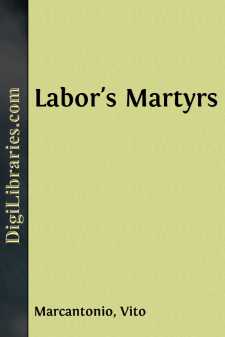Categories
- Antiques & Collectibles 13
- Architecture 36
- Art 48
- Bibles 22
- Biography & Autobiography 813
- Body, Mind & Spirit 142
- Business & Economics 28
- Children's Books 16
- Children's Fiction 13
- Computers 4
- Cooking 94
- Crafts & Hobbies 4
- Drama 346
- Education 46
- Family & Relationships 57
- Fiction 11829
- Games 19
- Gardening 17
- Health & Fitness 34
- History 1377
- House & Home 1
- Humor 147
- Juvenile Fiction 1873
- Juvenile Nonfiction 202
- Language Arts & Disciplines 88
- Law 16
- Literary Collections 686
- Literary Criticism 179
- Mathematics 13
- Medical 41
- Music 40
- Nature 179
- Non-Classifiable 1768
- Performing Arts 7
- Periodicals 1453
- Philosophy 64
- Photography 2
- Poetry 896
- Political Science 203
- Psychology 42
- Reference 154
- Religion 513
- Science 126
- Self-Help 84
- Social Science 81
- Sports & Recreation 34
- Study Aids 3
- Technology & Engineering 59
- Transportation 23
- Travel 463
- True Crime 29
Labor's Martyrs
by: Vito Marcantonio
Description:
Excerpt
Labor's Martyrs
By Vito Marcantonio
President, International Labor Defense
"These are my ideas. They constitute a part of myself. I cannot divest myself of them, nor would I if I could. And if you think that one can crush out these ideas that are gaining ground more and more every day; if you think you can crush them out by sending us to the gallows; if you would once more have people suffer the penalty of death because they have dared to tell the truth--and I defy you to show that we have told a lie--if death is the penalty for proclaiming the truth, then I will proudly and defiantly pay the costly price."-- (August Spies, just before he was sentenced to death on October 9, 1886.)
The man who spoke these words had no illusions. He knew that the court he was facing was a hostile court, an enemy court, a court determined to stamp out all that he stood for and believed in. He knew, also, that the truth of which he spoke was much bigger than the little man who sat in a black gown waiting for him to finish so that he could pronounce the brutal words that would mean his death on the gallows. He knew that the movement he represented was bigger than the forces which were trying to crush it and that it would survive.
Survive it did--to become one of the most powerful factors on the American scene today, one of the most vital factors in the extension and preservation of democracy and the rights for which he laid down his life.
And why should we venerate the memory of this man and the other victims of the Haymarket tragedy? Not simply because they were brave men. Not simply because they had the courage of their convictions and did not weaken in the face of death. But because their fight is still going on today, strengthened by their magnificent pioneer work, because of the foundation they helped lay for the American labor movement of the present day.
Back in 1886, that movement was still almost in its infancy. Noble attempts to build it had been made in the days of our Revolutionary forefathers. But all they did was to lay the groundwork, to drive in the first piles on which the rest of the structure could be built. The man of the early 'eighties of the last century began the actual construction.
One of the main issues around which they rallied the working people of this country was the fight for the eight-hour day. Albert Parsons, only 36 when he was executed, had spent more than ten years actively organizing American workers. He was a printer, a member of the powerful International Typographical Union which even in those days had over 60,000 members. He was a member of the Knights of Labor, the first great trade union center in American history. He was one of the outstanding spokesmen of the eight-hour day. An able orator, he toured the United States, soap-boxing, lecturing and recruiting supporters for the movement.
By his side was August Spies, a German worker from the metal trades industry, who carried the fight to the Central Trades Body of Chicago to which he was a delegate....


